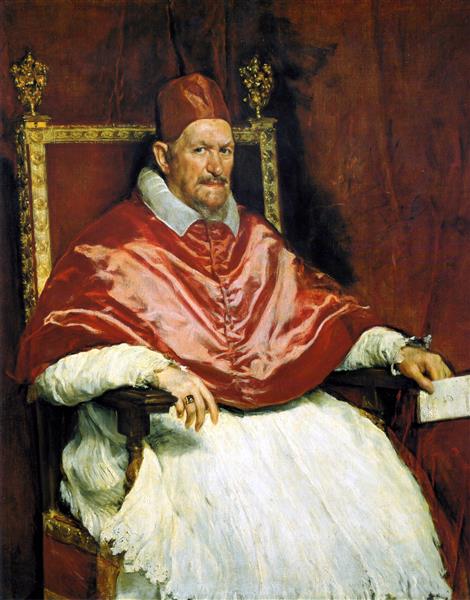Description
Diego Velázquez, one of the greatest masters of Spanish painting and a central figure of the Golden Age, achieved in his work "Portrait of Pope Innocent X", painted in 1650, a perfect synthesis between the power of the portrait and the humanity of the subject. This oil on canvas, which is in the collection of the Doria Pamphilj Gallery in Rome, is one of the most recognized and studied works of the European Baroque, and its impact endures throughout the centuries.
The portrait depicts Pope Innocent X, who sits with marked dignity in an austere and sober environment. From the first glance, the composition is characterized by a dark background that highlights the figure of the pontiff, amplified through the depth and texture in the fabric that envelops his body. Velázquez employs a restrained but effectively contrasting color scheme, where the intense red of the papal vestments is confronted by the dark neutrals of the background and the whites of the shirt, contributing to an atmosphere of sober majesty.
Meticulous attention to detail is one of the hallmarks of Velázquez's style. Every fold of the Pope's garment, every glint and reflection on his face and skin, is rendered with almost photographic precision, creating a sense of realism that transcends mere imitation of physical appearance. The use of light is equally fundamental; it is distributed in such a way as to model the figure of the pontiff, emphasizing his grave expression, which captures and conveys the complexity of his character and position. The Pope's gaze, penetrating and almost defiant, invites the viewer to contemplate not only the figure of a man in power, but also the burden of his responsibility.
One of the most intriguing and discussed aspects of this painting is the gaze of Innocent X. It conveys a mixture of authority and vulnerability, a trait that has inspired numerous interpretations and studies in the fields of art and psychology. Critics have often commented on the tension that seems to emanate from his countenance, a testament to the demanding and sometimes conflicting demands of the papacy at that time. This portrait is not only a reflection of a spiritual leader, but is a commentary on the role of power in human life, infused with the sense of loneliness and burden.
Comparing "Portrait of Pope Innocent X" with other contemporary portrait works, one finds its unique approach to the psychology of the sitter. While many portraits of the period tended to idealize their subjects, Velázquez dares to show his sitter in a moment of stark realism, reflecting his humanity rather than his divinity. This approach has been considered a precursor to the development of modern portraiture, where the complexity of the individual begins to be the subject of formal and emotional exploration by artists.
The work has left an indelible mark on subsequent art, influencing generations of painters. Velázquez's technique, his use of color, and the way he approaches the representation of the human figure open the door to a form of expression that is both monumental and intimate. In the context of his work, "Portrait of Pope Innocent X" is much more than just a portrait of a man; it is a monument to the ambiguity of human dignity and the experience of power that continues to resonate with modernity.
Ultimately, this masterpiece is not only a reflection of its time, but also establishes an ongoing dialogue between art and the psychology of power that remains relevant in our everyday lives.
KUADROS ©, a famous painting on your wall.
Hand-made oil painting reproductions, with the quality of professional artists and the distinctive seal of KUADROS ©.
Painting reproduction service with satisfaction guarantee. If you are not completely satisfied with the replica of your painting, we will refund 100% of your money.

